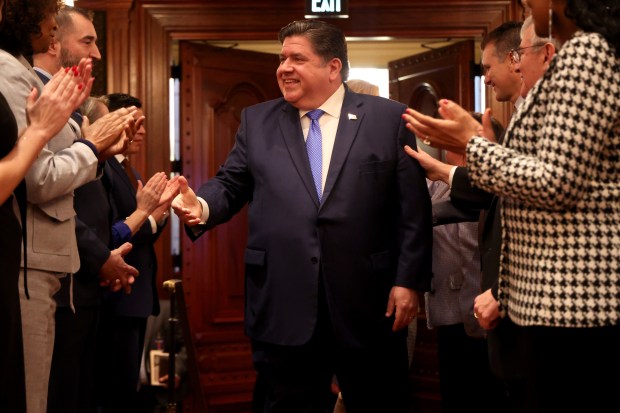Here’s the good news: Illinois lawmakers under Gov. J.B. Pritzker passed a balanced budget for the sixth straight year, protecting the state’s credit rating and continuing the relative fiscal stability that’s been consistent since the chaotic years of the Gov. Bruce Rauner-Speaker Mike Madigan political wars.
That’s about it for the good stuff, though. The bad — or at least worrying — news is that lawmakers approved more than $1 billion in new revenues to plug a shortfall for the coming fiscal year and to finance more spending for a wide variety of projects and programs. The budget the House sent to Pritzker in the wee hours Wednesday after a tumultuous night that made sausage-making look good by comparison strikes us as imprudent. The philosophy, if one can be gleaned from chaos, is spend what you can get your mitts on today and worry about tomorrow when it comes.
That’s akin to how some teenagers of our acquaintance think about money. But state leaders are supposed to be the grown-ups, led by the governor, guiding Illinois through what continues to be choppy fiscal waters. The grade we would give this year’s $53.1 billion budget is a C-minus, and that’s generous.
Why? Pritzker and fellow Democrats turned to an unusually wide array of cat-and-dog revenue raisers, aimed at keeping income taxes level for individuals. They included reducing how quickly businesses can write off their net operating losses from the pandemic era, sharply higher taxes on sports betting companies, a cap on the allowance retailers get for collecting and remitting sales taxes (more on that Monday), a new tax on firms that reserve and re-rent blocks of hotel rooms and more. That random assortment is the state-budget equivalent of looking under the couch cushions.
Even some Democrats are growing alarmed at the spending. As lawmakers were preparing to leave Springfield last week, Rep. Fred Crespo, D-Hoffman Estates, warned that next year’s budget is likely to feature yet another revenue shortfall, and that’s before lawmakers have to worry about coming train wrecks like the $700 million-plus funding cliff for Chicago public transit agencies. With Springfield having blown its wad on relatively “painless” revenue raisers this year, Crespo said, “There’s really only one place we can look at getting these revenues, and that’s taxpayers.”
Of course, this year is an election year for state lawmakers. Next year isn’t. Watch your wallets, Illinoisans.
Illinois’ tax burden, one of the highest in the nation when state and local taxes are taken into account, is one consideration. Another — and it’s directly tied to the revenue pressures the state now is feeling — is the business environment in Illinois and more particularly in Chicago, the state’s principal economic driver.
The easiest (and by far most politically popular) way to raise tax revenues is to create the conditions for business and population growth that produces those increases organically rather than having to take yet another bite of the existing pie. Those conditions certainly don’t exist in Chicago right now, at least not the way they should, due to a shaky city government dominated by progressive tax-and-spenders. In Illinois, the environment is brighter thanks to the Pritzker era’s fiscal stability, but the tax burden remains a major impediment.
Illinois Chamber of Commerce President Lou Sandoval echoed Crespo’s comments and chided Pritzker’s team for behaving “a little stand-offish on not allowing other core groups to have a seat at the table” during budget negotiations.
“I think at his core, (Pritzker) probably understands that you’re going to be hitting a gap here, and you’re going to be painting yourself into a corner,” Sandoval told Capitol City Now. “Where you have to raise taxes at some point.”
Pritzker dismissed Crespo’s comments and GOP criticism. “Every year, particularly Republicans say things like that,” he said. “They say, ‘Oh, we’re careening toward a brick wall.’ It hasn’t happened.”
Perhaps there are more rabbits to be pulled out of the budget next year. No one knows more about what the options are than an administration in power now for six years.
But these budget trends aren’t a surprise. They’ve been clear for a few years now and merited better planning. Much of the squeeze the state is feeling is due to the runoff of one-time federal contributions tied to the pandemic. Inherent in that largesse was the danger that state and local governments would grow accustomed to that cash and use it to create programs that couldn’t be supported with ordinary revenues. Once a program is established, there always will be advocates. And then the legislative trade-offs that come with every budget negotiation become ever more complex.
What is called for now is discretion — a change in attitude for this Democratic-dominated state. Listen to Rep. Crespo’s warning. Which programs are critical? Which are nice but simply not affordable right now? The Pritzker administration would do well to begin the process now of determining where to cut next year. Because cuts surely will be necessary to avoid the kinds of tax increases that hit more broadly than this year’s collection.
Submit a letter, of no more than 400 words, to the editor here or email letters@chicagotribune.com.



